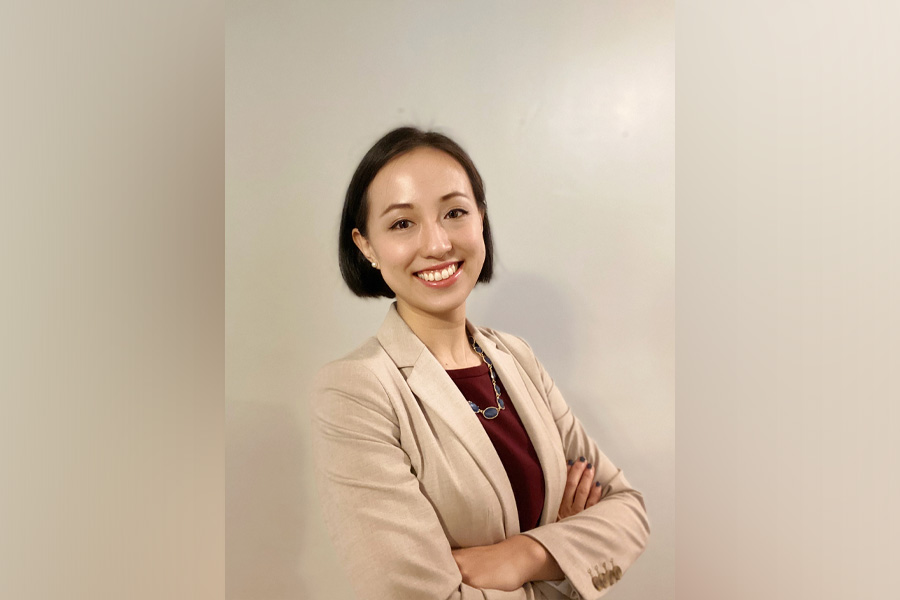Data Science in Detail: Irene Huang

Xieyining “Irene” Huang graduated from Florida State University in December 2021 with a doctorate in psychology and master’s degree in statistical data science. Huang started her career as a user experience researcher at insurance company State Farm and currently works as the director of global research and data for resiliency at TaskUs, a digital outsourcing company based in the U.S.
Where are you from, and what made you choose FSU?
I’m originally from Shanghai, China, and moved to the U.S. in 2011 to start my undergraduate studies at Northwestern University. I completed my first year of graduate school in psychology at Vanderbilt University. When my adviser, Dr. Joseph Franklin, took a position at FSU, I decided to move along with my adviser and my lab.
What inspired you to choose psychology through data science as your field of research?
I have always been interested in the human mind and behavior. When I was an undergraduate student at Northwestern University, I immediately became intrigued by the field of psychology. I also was so drawn to the required statistics course for psychology majors that I enrolled in graduate-level statistics courses as a senior undergrad.
For graduate school, I decided to pursue clinical psychology, specifically research on suicide and self-injury. It is such a huge, prevalent, yet highly stigmatized issue. I wanted to be able to make a positive impact on individuals’ lives. While I was completing my thesis on how to increase prediction accuracy for suicide risk, I started studying machine learning and programming on the side. After one year of self-study, I heard about the dual degree program at FSU, which allows students to pursue two graduate degrees at once. While pursuing my doctorate in psychology, I decided to also formally pursue a master’s degree in statistical data science through the Department of Statistics. It was a great decision! The curriculum enhanced my grasp of fundamental statistical concepts and helped me greatly during my dissertation process.
What was your favorite part about studying statistics and data science at FSU?
I thoroughly enjoyed being part of the statistics department at FSU. First and foremost, I love how much professors are invested in students. They believe in you, encourage you, and make you feel seen as a person. I still remember my very first statistics course — it was with professor Xufeng Niu. He remembered each student’s name and background, and he would excitedly greet me each time. I was a little apprehensive when I first started my degree in statistics given that it had been years since my calculus and linear algebra courses, and I was worried about not being able to catch up. However, professor Niu made me feel confident that I could do this. He was right — I ended up completing my master’s with flying colors!
In addition to the people at the department, I also liked how solid the curriculum is and how much the department emphasizes career development. There are so many webinars and colloquiums all the time. The professional seminar led by professor Elizabeth Slate has been tremendously helpful as well.
You currently work as director of global research and data for resiliency at TaskUs. What does your job entail?
My company TaskUs provides a variety of services to other businesses, such as customer experience, content moderation, AI tagging and more. I lead the global research division to conduct large-scale and innovative research to enhance content moderator wellbeing while informing industry standards (e.g., what should be the level of care content moderators receive for different types of content). There are many ever-evolving elements to my job, which makes it very exciting. Some of my major responsibilities include: mentor a team of researchers and data scientists/analysts; develop and execute quarterly and yearly strategic plans and goals; establish standard operating procedures to enhance research and data efficiency; supervise research projects, data analysis, and data reporting; and present data, research findings, recommendations, and best practices to VPs, executive-level managers and clients.
What is your favorite thing about your job? What has been most surprising to you about the field of data science?
Throughout my studies and career, I have always been drawn to fields or positions that offer both a challenge as well as an opportunity for making an impact. Not surprisingly, this is the reason why I decided to take this job, and it is still my favorite aspect of my job. My team, as well as TaskUs in general, is quickly growing. New challenges emerge on a regular basis, requiring me to problem-solve with innovative methods, and I enjoy the challenge. My current job also allows me to make a positive impact on individuals’ wellbeing by doing research on best practices for content moderation.
Surprisingly and not so surprisingly, you don’t spend 100 percent of the time researching or coding. To be an impactful researcher or data scientist, you also need time and effort to understand the business context, build stakeholder relationships and evangelize your findings. Being a data scientist involves more than just statistics or programming.
What advice do you have for students considering careers in data science?
Build solid technical skills, but make sure to prioritize networking and developing soft skills as well. Strong technical foundations will likely get your foot in the door. However, if you want to be successful, to be promoted, or to be a leader that others look up to, you need so much more: business acumen, project management skills, ability to convey technical information to a broad audience, and an ability to establish and maintain rapport with stakeholders. I encourage current students to take advantage of opportunities to present projects whenever possible, attend networking events, speak up during Q-&-A sessions at colloquiums, and interact with people from diverse backgrounds.

